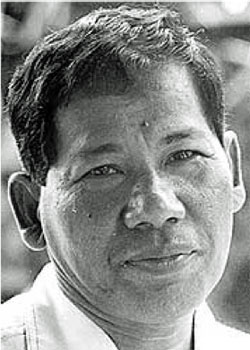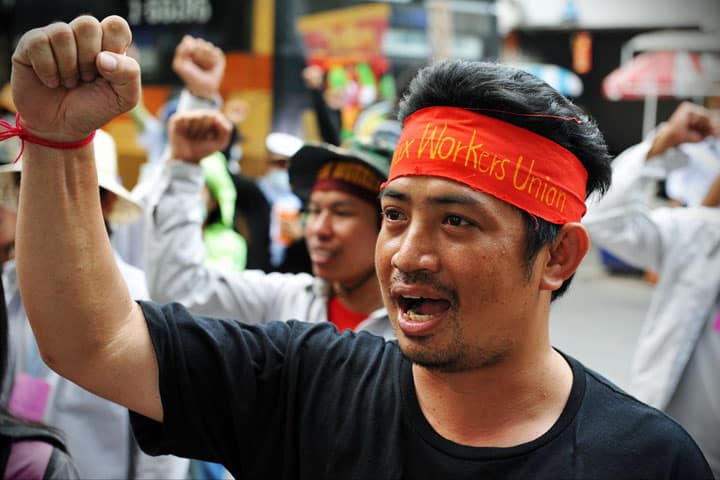
Thanong Pho-arn (Photo: Bangkok Post)
Trade unions in Thailand have always been opposed by the state and rarely played a role in improving the working conditions of Thai workers. This applies to a lesser extent to state-owned companies. The disappearance of trade union leader Thanong Pho-arn in June 1991 is a symbol of this.
Thanong Pho-arn
Thanong Pho-arn was a union leader for state-owned enterprises, president of the Federation of Thai Trade Unions and vice president of the International Federation of Free Trade Unions. On February 23, 1991, the Supreme Commander of the Struggle Complaints Suthorn Kongsompong (the father of current Army Commander Apirat Kongsompong) and Army Commander Suchinda Kraprayoon staged a coup against Chatichai Choonhavan's government and took to rule as the National Peace Council, the NPKC. The coup plotters wanted to fight corruption, improve administration and protect the monarchy, citing the threat of assassinations in the XNUMXs.
Shortly after taking office, the junta banned all trade union activities. Thanong openly opposed this exclusion of unions in the public domain and spoke out in strong terms against the military's seizure of power and the declaration of a state of emergency. In early June 1991, he organized a demonstration on the Sanaam Luang. He found himself being followed during that time afterwards and he also received death threats by phone.
Thanong planned to attend the annual meeting of the International Labor Organization (ILO) in Geneva in June. The Ministry of the Interior wrote him a letter forbidding him to attend that meeting. Thanong intended to defy that order. He told his wife, Rachaneeboon, that "…if he didn't respond for three days he would have been arrested, and if it were more than seven days he would be dead…"
On June 19, 1991, Thanong disappeared. His car with signs of a fight was found empty in front of his office. There were also the insulin injections he needed for his diabetes. The deputy interior minister said Thanong had probably fled his wife and family.
A police investigation turned up nothing. After the Black May uprising in 1992 that ousted General Suchinda and caused dozens of deaths, Anand Panyarachun's government set up a committee to investigate Narong's disappearance. After two months of investigation, that committee came to the conclusion that there was no indication whatsoever of what had happened to Narong. However, she declined to release the full report. The same procedure was followed by the two parliamentary committees in 1 and 1993. The international trade union organizations supported Narong's widow and their two young children financially.
A Brief and Incomplete History of Trade Unions in Thailand
Until about 1950, the working class in Siam/Thailand consisted for the most part of originally Chinese migrant workers. It grew under the reign of King Chulalongkorn (Rama V, 1868-1910), mainly due to the increasing public works such as roads, railways and other infrastructure. The population of Bangkok then consisted of 30-50% people of Chinese descent. In 1910 there was a major strike that paralyzed Bangkok and scared King Vajirawuth (Rama VI, 1910-1925) ). An anti-Chinese atmosphere emerged, for example in a 1934 law that ordered that half of the workers in rice mills should be real Thais.
After 1950, immigration from China was stopped and more Thais, albeit still in small numbers, joined the workforce. The population increased sharply at that time, but there was still enough land to be cultivated to accommodate the growth of the farming population in particular. Between 1970 and 1980, that possibility disappeared and, moreover, the share of industry in the Thai economy, which sometimes grew by more than 10%, increased rapidly. More and more people from the periphery went to work in the new factories in Bangkok and the surrounding area, first during the periods when agriculture was at a standstill and later also more permanently.
This development promoted the further development of unions which first emerged in the 1s, for example in the railways and trams in Bangkok. After World War II, it rapidly increased in size. For example, on May 1947, 70.000, there was a meeting of XNUMX workers from rice mills, sawmills, dock workers and railways.
A turning point came when General Sarit Thanarat seized power in 1958. He banned all activities of trade unions, he believed that employers and employees should arrange working conditions in mutual harmony with Vadertje Staat. The same thing happened in 1991 when General Suchinda Kraprayoon staged a coup.
After the October 1973 uprising, a more open and free time began. While before that the number of strikes per year was perhaps twenty, in this period it was between 150 and 500 per year. The peasants organized and demanded improvements in tenancy and property rights. In those years, this already led to the assassinations of about 40 peasant leaders and that movement died after the mass murder at Thammasat University in October 1976 (see link below). In 1976, the leader of a Socialist Party, Boonsanong Punyodyana, was also assassinated.

Trade union demonstration in Bangkok (1000 Words / Shutterstock.com)
In fact, all governments since 1945 have done their utmost to suppress the influence of trade unions on government policy.
Nevertheless, in a more free period between 1973 and 1976, a law was passed to regulate trade union activities. Many of those rules still apply today. For example, a union may only represent a single company or industry in negotiations, and only if more than 20% of the employees in that company are union members. The union must be registered with the Ministry of Labour. An umbrella union is allowed, but it cannot negotiate for all employees together. Migrant workers from surrounding countries are not allowed to join Thai unions.
For the above reasons, the unions in Thailand are very fragmented, there are more than a thousand. They also compete with each other, have few members (only 3.7% are members) and low income and are therefore weak and ineffective. Nearly 80% of all unions are located in Greater Bangkok, while half of all 76 Thai provinces have no unions. The unions of the state-owned enterprises are an exception. They usually support government policies and enjoy benefits such as a salary that is sometimes 50% higher than in other companies, and other more favorable working conditions.
In addition, companies pursued a policy to exclude active trade union members. They were often fired or antagonized in other ways, sometimes illegal and violent. During a strike, the company was often closed to be set up again somewhere else, for example with only piecework that was not subject to any rules.
These three elements, government policies and laws that hinder the effectiveness of union intervention, a weak organization of the unions themselves and a license for companies to oppose union activities have resulted in generally poor working conditions in Thailand. The informal sector, in which about 50-60% of all working people participate, is also barely organized and therefore unable to make a fist.
The book of Pasuk mentioned below therefore says at the end of the chapter 'Labour':
Labor forces and organizations became a political ghost whose appearance haunted dictators and their friends.
Main source
Pasuk Phongpaichit and Chris Baker, Thailand, Economy and Politics, 2002
Excellent recent article on the Thai trade unions
about the farmers' protests
https://www.thailandblog.nl/geschiedenis/boerenopstand-chiang-mai/
For those who want to read more about unions in Thailand, a more recent article from 2010:
https://library.fes.de/pdf-files/bueros/thailand/07563.pdf
quote from it:
Throughout their long history, Thai unions have maintained a precarious existence under various governments. At present, there are no signs of a major shift in labor policies.
The 2006 military coup and the return of conservative elites and the military that have always been suspicious of labor organizations and a welfare state are expected to have damaging consequences for the Thai labor community. The political crisis and social division following the coup also contributed to the split within the Thai labor movement
The increased pressure of regional and global competition on Thai companies due to the 2008 financial crisis has increased employer resistance to unions and further weakened the bargaining power of Thai unions.
One of the main challenges for the Thai labor movement remains its weakness in terms of internal democratic and efficient structures, as well as unity and coordination within the labor movement.


“One of the main challenges for the Thai labor movement remains its weakness in terms of internal democratic and efficient structures, as well as unity and coordination within the labor movement.”
This closing sentence is significant.
If it is not even possible to build up a reliable and competent representation, then it is not surprising that you are not taken seriously or opposed?
From my work I know that in the last 10 years under Thai direction, several attempts have been made to set up a professional association to act as a discussion partner with the government.
The roosters (in this case hens) were the people who, based on age and money, wanted to be in charge and, above all, wanted no contradiction.
The reason is more than obvious. It's more about the function than the collaboration. Cooperation yields less than finding the right contacts to serve one's own interest. Since this is now known, other participants often quickly realize that it is all useless and so the vicious circle continues to exist.
Speaking of democracy, they really did everything they could to silence,
The young people will resist and rightly so
The lack of strong unions and other things we take for granted hurts me. Well, I'm one of those left-finger wavers who don't want to understand that Taailand is very different. In the meantime I read messages on social media along the lines of F the government, what should we do now? Staying at home without a decent safety net (paid leave, benefits, etc.). It's brewing.
Your thought doesn't matter either Rob, because everyone has their own thing 🙂
Read for fun is the piece in the link https://annettedolle.nl/2019/02/25/waarom-de-vakbond-een-overprijsde-verzekeringmaatschappij-is-en-haar-langste-tijd-gehad-heeft/
It's kind of about the union instilling fear and dwelling on the past.
Without members there is no right to exist and that also applies to employers. Not a good employer no employees. The ultimate choice to offer yourself as an employee to a “bad” employer lies with that same employee.
If, for example, it turns out that 5-star hotels are easily discharging permanent staff due to Covid 19, then these people can go to the SSO for a benefit for 180 days ( https://is.gd/zrLKf3 )
In addition, there will have to be a Facebook action where these matters are reported and can be reacted strongly to by those involved and then generate international attention with the risk of reputational damage of the hotel chains concerned. That Facebook event can be a clean task for you and your supporters because it is not tied to a location.
If the story is well put together, I will of course give you my Facebook "like"